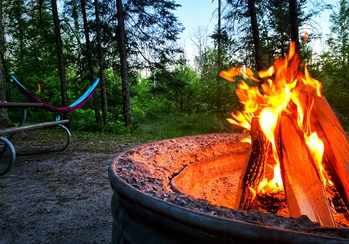

|
Moving firewood when you camp, hunt or head out for a weekend getaway means you risk carrying tree-killing insects and diseases to new places. Invasive pests can crawl out, infesting trees and carrying diseases that can forever change the landscape of the places you love.
According to the Michigan Department of Agriculture and Rural Development, there are 140 pests and diseases that can be moved with firewood. Some, like oak wilt, hemlock woolly adelgid and spotted lanternfly are already present in Michigan, while others such as Asian longhorned beetle are infesting nearby states.
“On their own, these insects and diseases can’t travel very far, but they can travel hundreds of miles on firewood,” said Joanne Foreman, Invasive Species Program communications coordinator with the DNR. “Trees cut for firewood often died due to insects or disease. Why risk carrying oak wilt to your cabin or beech bark disease to your favorite camping spot?”
Keep the fire burning
You can still have a roaring campfire or a cozy night in front of the fireplace – just make sure to burn safely:
Know before you go
Firewood policies vary greatly among national parks, national forests, private campgrounds and other lands in Michigan. Call ahead or visit DontMoveFirewood.org for more information.
In state parks, the DNR requests visitors purchase certified, heat-treated firewood sold in the parks or at some local stores and roadside stands.
Information on invasive tree pests and diseases of concern in Michigan can be found at Michigan.gov/Invasives.